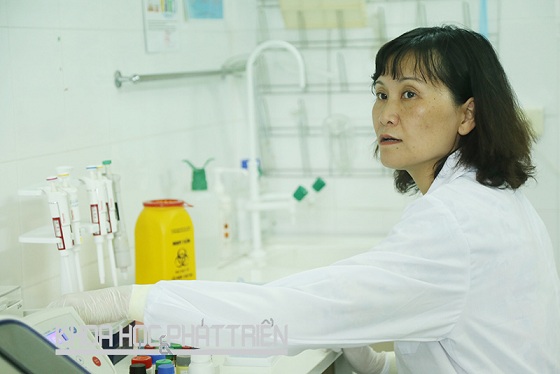
One of Dr Hoang Thị Thu Ha's most prominent works is the pertussis acellular vaccination for pregnant women to protect children from the time of birth.
 |
One of Dr Hoang Thị Thu Ha’s most prominent works is the pertussis acellular vaccination for pregnant women to protect children from the time of birth.
The associate professor from the National Institute of Hygiene and Epidemiology is the only female scientist nominated for the 2017 Ta Quang Buu Award.
In 2012, Belgium invited Vietnamese scientists to work in clinical trials of the pertussis vaccine in pregnant women in Vietnam. With the scientific knowledge acquired, Ha and her co-workers set to work on the project, though they anticipated difficulties.
The research plan was approved by MST and the Ministry of Health's Board of Ethics, under which the Vietnamese side would be independent in expenses, but the method of implementation and selection of subjects would be similar to Belgium’s.
The research was carried out in Ha Nam province, and in order to assess the effects of the vaccination on pregnant women, the researchers had to take blood samples from children for testing.
Dr Vu Ngoc Ha from Hanoi National University, a co-worker of Hoang Thi Thu Ha, said it was difficult work.
“Not all pregnant women accepted to have the vaccination. So we had to be completely open. We clarified the risks they would face and we had to travel a lot to meet them during research,” Ha recalled.
“Some pregnant women accepted, but they missed the dates. To take blood samples of children, I had to go directly to their houses,” she said.
The blood samples were described by scientists as ‘diamonds’ because they were precious. It was difficult to take blood samples from small children, and they could not take them in a large quantity.
Thu Ha said every time she prepared blood samples and gave injections to pregnant women, she felt so worried she could not sleep.
The hard work paid off. The research team proved that the pertussis acellular vaccination for pregnant women helped mitigate infection risks for children, especially those aged under two months, who are not old enough to have a vaccination.
“I have to admit that I am greedy,” Ha said. “A teacher of mine said one needs to be greedy if you are a microbiologist. You need to retain all types of bacteria and have to create a sample bank of your own.”
Ha keeps many microbiology samples as her ‘dowry’ which she believes will be useful for her research in the future. “I have also added samples left by teacher to my dowry treasure,” she said.
(Source: VNN)




